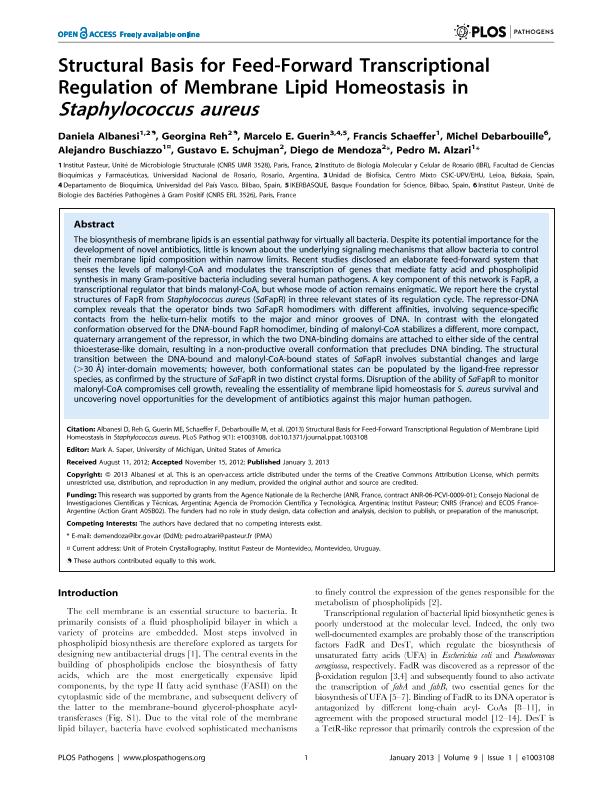Mostrar el registro sencillo del ítem
dc.contributor.author
Albanesi, Daniela

dc.contributor.author
Reh, Georgina

dc.contributor.author
Guerin, Marcelo E.
dc.contributor.author
Schaeffer, Francis
dc.contributor.author
Debarbouille, Michel
dc.contributor.author
Buschiazzo, Alejandro
dc.contributor.author
Schujman, Gustavo Enrique

dc.contributor.author
de Mendoza, Diego

dc.contributor.author
Alzari, Pedro
dc.date.available
2016-03-17T18:14:42Z
dc.date.issued
2013-01
dc.identifier.citation
Albanesi, Daniela; Reh, Georgina; Guerin, Marcelo E.; Schaeffer, Francis; Debarbouille, Michel; et al.; Structural basis for feed-forward transcriptional regulation of membrane lipid homeostasis in Staphylococcus aureus; Public Library Of Science; Plos Pathogens; 9; 1; 1-2013; e1003108-e1003108
dc.identifier.issn
1553-7366
dc.identifier.uri
http://hdl.handle.net/11336/4840
dc.description.abstract
The biosynthesis of membrane lipids is an essential pathway for virtually all bacteria. Despite its potential importance for the development of novel antibiotics, little is known about the underlying signaling mechanisms that allow bacteria to control their membrane lipid composition within narrow limits. Recent studies disclosed an elaborate feed-forward system that senses the levels of malonyl-CoA and modulates the transcription of genes that mediate fatty acid and phospholipid synthesis in many Gram-positive bacteria including several human pathogens. A key component of this network is FapR, a transcriptional regulator that binds malonyl-CoA, but whose mode of action remains enigmatic. We report here the crystal structures of FapR from Staphylococcus aureus (SaFapR) in three relevant states of its regulation cycle. The repressor-DNA complex reveals that the operator binds two SaFapR homodimers with different affinities, involving sequence-specific contacts from the helix-turn-helix motifs to the major and minor grooves of DNA. In contrast with the elongated conformation observed for the DNA-bound FapR homodimer, binding of malonyl-CoA stabilizes a different, more compact, quaternary arrangement of the repressor, in which the two DNA-binding domains are attached to either side of the central thioesterase-like domain, resulting in a non-productive overall conformation that precludes DNA binding. The structural transition between the DNA-bound and malonyl-CoA-bound states of SaFapR involves substantial changes and large (>30 Å) inter-domain movements; however, both conformational states can be populated by the ligand-free repressor species, as confirmed by the structure of SaFapR in two distinct crystal forms. Disruption of the ability of SaFapR to monitor malonyl-CoA compromises cell growth, revealing the essentiality of membrane lipid homeostasis for S. aureus survival and uncovering novel opportunities for the development of antibiotics against this major human pathogen.
dc.format
application/pdf
dc.language.iso
eng
dc.publisher
Public Library Of Science

dc.rights
info:eu-repo/semantics/openAccess
dc.rights.uri
https://creativecommons.org/licenses/by/2.5/ar/
dc.subject
Lipid Homeostasis
dc.subject
Transcriptional Regulation
dc.subject
Staphylococcus Aureus
dc.subject
Antibiotic Target
dc.subject.classification
Biología Celular, Microbiología

dc.subject.classification
Ciencias Biológicas

dc.subject.classification
CIENCIAS NATURALES Y EXACTAS

dc.title
Structural basis for feed-forward transcriptional regulation of membrane lipid homeostasis in Staphylococcus aureus
dc.type
info:eu-repo/semantics/article
dc.type
info:ar-repo/semantics/artículo
dc.type
info:eu-repo/semantics/publishedVersion
dc.date.updated
2016-03-30 10:35:44.97925-03
dc.journal.volume
9
dc.journal.number
1
dc.journal.pagination
e1003108-e1003108
dc.journal.pais
Estados Unidos

dc.journal.ciudad
San Francisco
dc.description.fil
Fil: Albanesi, Daniela. Institut Pasteur. Unité de Microbiologie Structurale; Francia. Consejo Nacional de Investigaciones Científicas y Técnicas. Centro Científico Tecnológico Rosario. Instituto de Biología Molecular y Celular de Rosario; Argentina
dc.description.fil
Fil: Reh, Georgina. Consejo Nacional de Investigaciones Científicas y Técnicas. Centro Científico Tecnológico Rosario. Instituto de Biología Molecular y Celular de Rosario; Argentina
dc.description.fil
Fil: Guerin, Marcelo E.. Centro Mixto CSIC-UPV/EHU. Unidad de Biofisica; España. Universidad del Pais Vasco; España. Basque Foundation for Science. IKERBASQUE; España
dc.description.fil
Fil: Schaeffer, Francis. Institut Pasteur. Unité de Microbiologie Structurale; Francia
dc.description.fil
Fil: Debarbouille, Michel. Institut Pasteur. Unité de Biologie des Bactéries Pathogènes è Gram Positif; Francia
dc.description.fil
Fil: Buschiazzo, Alejandro. Institut Pasteur. Unité de Microbiologie Structurale; Francia
dc.description.fil
Fil: Schujman, Gustavo Enrique. Consejo Nacional de Investigaciones Científicas y Técnicas. Centro Científico Tecnológico Rosario. Instituto de Biología Molecular y Celular de Rosario; Argentina
dc.description.fil
Fil: de Mendoza, Diego. Consejo Nacional de Investigaciones Científicas y Técnicas. Centro Científico Tecnológico Rosario. Instituto de Biología Molecular y Celular de Rosario; Argentina
dc.description.fil
Fil: Alzari, Pedro. Institut Pasteur. Unité de Microbiologie Structurale; Francia
dc.journal.title
Plos Pathogens

dc.relation.alternativeid
info:eu-repo/semantics/altIdentifier/url/http://journals.plos.org/plospathogens/article?id=10.1371/journal.ppat.1003108
dc.relation.alternativeid
info:eu-repo/semantics/altIdentifier/doi/http://dx.doi.org/10.1371%2Fjournal.ppat.1003108
dc.relation.alternativeid
info:eu-repo/semantics/altIdentifier/doi/10.1371/journal.ppat.1003108
dc.relation.alternativeid
info:eu-repo/semantics/altIdentifier/pmid/PMC3536700
dc.relation.alternativeid
info:eu-repo/semantics/altIdentifier/url/http://www.ncbi.nlm.nih.gov/pmc/articles/PMC3536700/
Archivos asociados
